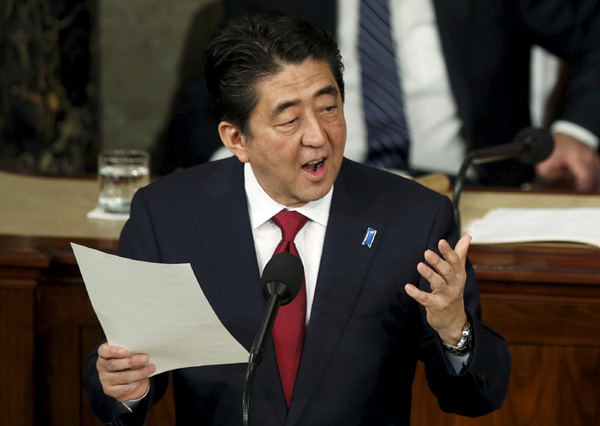US' ability to control Japan has abated
Updated: 2015-05-05 07:50
By Ted Galen Carpenter(China Daily)
|
||||||||
 |
|
Japanese Prime Minister Shinzo Abe holds his text as he addresses a joint meeting of the US Congress on Capitol Hill in Washington, April 29, 2015. [Photo/Agencies] |
Because of bitter historical memories, China has long been wary about a Japanese military revival. Indeed, even during the chilliest days of the Cold War, China provided mixed signals about the US military presence in East Asia.
Although Washington's motive to contain communist (including Chinese communist) influence was evident, and therefore resented, Chinese leaders also seemed to believe that America's supervision restrained Tokyo and prevented its rise as a strong, independent military power.
In recent years, US leaders have gradually become increasingly receptive to Japan playing a more active security role. The previous ambivalence faded noticeably during the George W. Bush's administration, and that trend has continued throughout the Barack Obama years. The implicit focus of the rebalancing strategy and other elements of US policy in East Asia is to contain China's growing power and influence.
Washington has looked on benignly as Japanese Prime Minister Shinzo Abe's government developed military systems with power projection capabilities, such as the new helicopter carrier, signed arms sale agreements with other countries, and "reinterpreted" Article 9 of Japan's pacifist Constitution to permit military missions beyond situations of strict self-defense.
The American public, however, remains decidedly ambivalent about Japan playing a more extensive security role. A recent Pew Institute survey found that 47 percent would welcome such a change, in part to alleviate the financial and logistical burdens on the United States, but 43 percent believed that, given Japan's history of aggression in the 20th century, it should strictly limit its military role.
The Abe government's recent actions are not likely to reduce the uneasiness in the US, China or other countries. Tokyo has adopted an uncompromising stance on two contentious territorial issues.
Actions by Abe and some close associates reinforce such suspicions. Measures that have been especially unhelpful include the Japanese prime minister's visits to Yasukuni Shrine (even though individuals honored there include World War II war criminals), continued reluctance to accept historical responsibility for "comfort women" - women who were forced into sexual slavery by the Japanese military personnel during WWII, and Abe's indiscreet comments suggesting that Japan was something other than a blatant aggressor before and during WWII. Some of those incidents have dismayed even usually supportive US officials.
Although there is virtually no danger that Japan will embark on another aggressively expansionist binge, these actions taken together indicate that it is pursuing an increasingly bold, nationalist agenda. That development is likely to make China, South Korea and other neighbors nervous. It also may cause mixed emotions in Washington. US leaders no doubt like the concept of a more robust and capable ally in East Asia.
However, Japan's assertiveness can also entangle the US in problems it would prefer to avoid. For example, Tokyo's uncompromising attitude on the Diaoyu Islands (called Senkaku Islands in Japan) issue places Washington in an uncomfortable position. Japanese pressure virtually forced the Obama administration to confirm that the bilateral mutual defense treaty covers those islands - even though their legal status remains very much in dispute. Any armed incident between China and Japan over that issue would create an immediate crisis for the US.
The regional strategic dynamic has changed in a fundamental fashion. Japan is becoming a far more capable military ally than in previous decades, but US leaders must accept the corresponding reality that Japan also will be a much more independent-minded power with its own policy agenda. Tokyo's goals may sometimes conflict with Washington's policy preferences or even important US interests. China and other East Asian powers likewise need to realize that the US' ability to control Japan's actions in the security arena has already diminished and is likely to fade further in the coming years.
The author is a senior fellow for defense and foreign policy studies at the Cato Institute.
Courtesy: China&US Focus
- Global health entering new era: WHO chief
- Brazil's planning minister steps aside after recordings revelation
- Vietnam, US adopt joint statement on advancing comprehensive partnership
- European border closures 'inhumane': UN refugee agency
- Japan's foreign minister calls A-bombings extremely regrettable
- Fukushima impact unprecedented for oceans: US expert

 Stars of Lijiang River: Elderly brothers with white beards
Stars of Lijiang River: Elderly brothers with white beards
 Wealthy Chinese children paying money to learn British manners
Wealthy Chinese children paying money to learn British manners
 Military-style wedding: Fighter jets, grooms in dashing uniforms
Military-style wedding: Fighter jets, grooms in dashing uniforms
 Striking photos around the world: May 16 - May 22
Striking photos around the world: May 16 - May 22
 Robots help elderly in nursing home in east China
Robots help elderly in nursing home in east China
 Hanging in the air: Chongqing holds rescue drill
Hanging in the air: Chongqing holds rescue drill
 2.1-ton tofu finishes in two hours in central China
2.1-ton tofu finishes in two hours in central China
 Six things you may not know about Grain Buds
Six things you may not know about Grain Buds
Most Viewed
Editor's Picks

|

|

|

|

|

|
Today's Top News
Liang avoids jail in shooting death
China's finance minister addresses ratings downgrade
Duke alumni visit Chinese Embassy
Marriott unlikely to top Anbang offer for Starwood: Observers
Chinese biopharma debuts on Nasdaq
What ends Jeb Bush's White House hopes
Investigation for Nicolas's campaign
Will US-ASEAN meeting be good for region?
US Weekly

|

|









